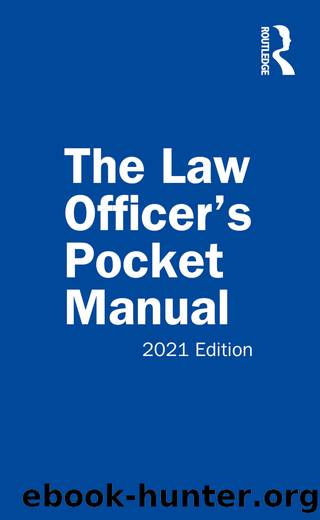The Law Officer's Pocket Manual by unknow

Author:unknow
Language: eng
Format: epub
Tags: Social Science, Criminology
ISBN: 9781000387445
Google: RMIZEAAAQBAJ
Publisher: Routledge
Published: 2021-03-30T02:17:16+00:00
F. The Suspect's Answer
If a suspect says he does not want to answer questions after you have given the Miranda warnings and have asked if the suspect understands the warnings and will answer questions, you should not question the suspect further.
Before questioning a suspect, you should obtain a statement, preferably in writing and signed, that the suspect understands the warnings and is willing to answer questions without the presence of an attorney.
It is not absolutely necessary that you obtain such a statement before questioning a suspect, but it is by far the better practice to do so.
Remember, the prosecution must prove that the suspect willingly answered questions and knew what he was doing. The fact that the suspect remains silent after being warned does not mean that the suspect has agreed to questioning. The suspect must affirmatively show that he is waiving his rights and is willing to answer questions. This affirmative showing, however, can be inferred from a suspectâs decision to talk despite having been warned of the Miranda rights.
For example, police officers take a suspect into custody for questioning about a fatal shooting. The officers give the suspect the Miranda warnings and verbally confirm that he understands them. The officers, however, do not expressly ask the suspect whether he is willing to answer their questions without a lawyer. Instead, they question the suspect for two hours while he, for the most part, sits silently or responds with one-word âyesâ or ânoâ answers. Eventually, one of the officers asks about the suspectâs faith, and the suspect makes an incriminating response.
The suspectâs statement is usable in court. The suspect understood his Miranda rights, and his statement clearly indicates that he decided to waive those rights.
If a suspect in custody requests a lawyer, the suspect may not be questioned by any official about any offense unless a lawyer is present, unless the suspect later waives the right to counsel, or unless there has been a break in custody.
This rule applies no matter what stage the interrogation has reached. The suspect may interrupt your reading of the warnings and demand counsel; or the suspect may make a demand for counsel when you have completed the warnings; or the suspect may answer some of your questions and then reconsider and ask to talk to a lawyer. In all these cases, the rule is the same: your questioning must stop.
Once a suspect makes a clear request for a lawyer, any questioning by any official is forbidden as long as the suspect remains in custody. For example, you give the required warnings to a jailed suspect and try to question him about a burglary. But he asks for a lawyer, so you stop the interrogation, and he is taken back to his jail cell. Later, officers from another city come to the jail and initiate questioning about crimes they suspect he has committed in their jurisdiction. The answers he gives are inadmissible even if he has agreed to talk to them and even if those officers did not know about his earlier request for counsel.
Download
This site does not store any files on its server. We only index and link to content provided by other sites. Please contact the content providers to delete copyright contents if any and email us, we'll remove relevant links or contents immediately.
The Borden Murders by Sarah Miller(3597)
The Secret Barrister by The Secret Barrister(3016)
Coroner's Journal by Louis Cataldie(2109)
Police Exams Prep 2018-2019 by Kaplan Test Prep(2041)
The Splendid and the Vile by Erik Larson(1794)
Terrorist Cop by Mordecai Dzikansky & ROBERT SLATER(1724)
A Colony in a Nation by Chris Hayes(1514)
My Dark Places by James Ellroy(1511)
Black Klansman by Ron Stallworth(1449)
A Life of Crime by Harry Ognall(1384)
Objection! by Nancy Grace(1338)
Whoever Fights Monsters by Robert K. Ressler(1326)
The New Jim Crow by Michelle Alexander(1321)
American Prison by Shane Bauer(1292)
Obsession (The Volkov Mafia Series Book 1) by S.E Foster(1283)
Anatomy of Injustice by Raymond Bonner(1273)
The Art of Flight by unknow(1268)
A Higher Loyalty by Comey James(1245)
A is for Arsenic: The Poisons of Agatha Christie (Bloomsbury Sigma) by Kathryn Harkup(1217)
